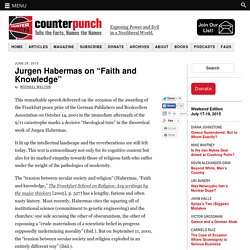

Assembled Philosophers. Curriculum. A Life Worth Living: Albert Camus on Our Search for Meaning and Why Happiness Is Our Moral Obligation. By Maria Popova Why “the demand for happiness and the patient quest for it” isn’t a luxury or a mere need but our existential duty.

Julian Baggini — I still love Kierkegaard. I fell for Søren Kierkegaard as a teenager, and he has accompanied me on my intellectual travels ever since, not so much side by side as always a few steps ahead or lurking out of sight just behind me.

Perhaps that’s because he does not mix well with the other companions I’ve kept. I studied in the Anglo-American analytic tradition of philosophy, where the literary flourishes and wilful paradoxes of continental existentialists are viewed with anything from suspicion to outright disdain. In Paris, Roland Barthes might have proclaimed the death of the author, but in London the philosopher had been lifeless for years, as anonymous as possible so that the arguments could speak for themselves. Discovering that your childhood idols are now virtually ancient is usually a disturbing reminder of your own mortality. Jurgen Habermas on “Faith and Knowledge” This remarkable speech delivered on the occasion of the awarding of the Frankfurt peace prize of the German Publishers and Booksellers Association on October 14, 2001 in the immediate aftermath of the 9/11 catastrophe marks a decisive “theological turn” in the theoretical work of Jurgen Habermas.

It lit up the intellectual landscape and the reverberations are still felt today. This text is extraordinary not only for its cognitive content but also for its marked empathy towards those of religious faith who suffer under the weight of the pathologies of modernity. The “tension between secular society and religion” (Habermas, “Faith and knowledge,” The Frankfurt School on Religion: key writings by the major thinkers [2005], p. 327) has a lengthy, furious and often nasty history. “Entirely different way”: the suicidal murderers who transformed aircraft into bombs were “motivated by religious beliefs. Then President George W. Fundamentalism is a Modern Phenomenon Unequally Distributed Burdens. Psychiater-filosoof Damiaan Denys. Psychiater en hoogleraar Damiaan Denys is gespecialiseerd in angsten.

Nederland is een bang land dat ALLES ONDER CONTROLE wil houden, constateert de Vlaming. ‘Maar angst is juist het deurtje dat ons de vrijheid toont.’ Toen Damiaan Denys (1965) vijftien jaar geleden vanuit België naar Nederland verhuisde, trof hij een betrekkelijk ontspannen en vrij land aan. Hij zag overal water, in de vijvers, meren en rivieren, en nergens hekjes om het af te rasteren. Zo moest het zijn, vond hij. Rebecca Newberger Goldstein: What Plato can teach us.
Rebecca Newberger Goldstein © Steven Pinker Anyone who’s done an undergraduate degree in philosophy will have been made to read the great philosophers of the past—the 16th and 17th-century rationalists and empiricists, certainly, probably some Kant, and in all likelihood Plato and Aristotle as well.

For decades, particularly in the anglophone world, students were encouraged to treat such monuments of the western tradition as Plato’s Republic or Kant’s Critique of Pure Reason not as relics to be venerated but rather as if they’d been published in the most recent issue of a scholarly journal such as Mind. It’s the arguments in these books that matter, so the thinking went, and if these turned out to be deficient when judged against the most rigorous contemporary standards, then so much the worse for Plato or Kant. Kierkegaard on the Individual vs. the Crowd, Why We Conform, and the Power of the Minority. By Maria Popova “Truth always rests with the minority … because the minority is generally formed by those who really have an opinion, while the strength of a majority is illusory, formed by the gangs who have no opinion.”

“When you adopt the standards and the values of someone else,” Eleanor Roosevelt wrote in her spectacular meditation on happiness and conformity, “you surrender your own integrity [and] become, to the extent of your surrender, less of a human being.” And yet conformity is not only a survival strategy for us but also something institutionally indoctrinated in our culture. A century earlier, the great Danish writer and thinker Søren Kierkegaard, celebrated as the first true existentialist philosopher and an active proponent of the benefits of keeping a diary, contemplated this eternal tension between the individual and the crowd. De uitgerekte tijd van Henri Bergson. Nu alles door de internet technologie steeds maar sneller gaat duikt steeds vaker de naam van de Franse filosoof Henri Bergson (1859-1941) op, de schrijver van het boek over de heel andere tijd die wij in ons hebben.

Het is maar al te begrijpelijk dat men is gaan denken dat de tijd steeds sneller gaat nu dagelijks in advertenties wordt geroepen dat je ‘nog sneller internet!’ Kunt krijgen. Nóg sneller, dat betekent nog sneller dan de fractie van een seconde die internet er nu over doet om iets tevoorschijn te toveren waarom je hebt gevraagd. Vandaar dat het een weldadige mededeling is dat Oek de Jong ruim acht jaar heeft gedaan over zijn roman Pier en oceaan en dat Donna Tart pas na tien jaar klaar was met de duizend pagina’s van Het puttertje.
Dat zijn duidelijke signalen in de richting van de opdringerige jachtige werkelijkheid: niet geïmponeerd keerden ze die werkelijkheid de rug toe en hielden hun eigen tempo aan. Henri Bergson. PHILOSOPHY - Epicurus.